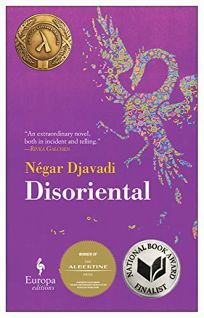
It’s rare to find a book whose title sums it up so perfectly, and perhaps rarer still that the exceptionality of this title was preserved in the process of translating it from French to English. The title “Disoriental” can be interpreted in a myriad of ways, yet it would be difficult to find a meaning that doesn’t apply.
In her struggle to come to terms with her own identity as the daughter of political refugees displaced from Iran, the narrator Kimiâ explores how the pivotal action of fleeing her birth-country re-oriented her understanding of herself. While the title certainly applies to Kimiâ’s disorientation and feelings of exile as an immigrant, it could also be interpreted as Kimiâ’s misunderstood sexual orientation, her complicated relationship with her family, or even her geographic locale (in a particularly memorable scene, a 10-year old Kimiâ finds herself in Turkey in transit from the “Orient” to the west, leaving behind all that she knew for a new beginning.) “Disoriental” could even arguably be used to describe author Négar Djavadi’s writing style, an unarmingly casual voice that jumps from present to past based on tangential ideas or whim.
While the story is told in a disjointed manner, doing so creates a richer reward. Kimiâ relishes in hinting at future events and describing in snippets her lonely present-day wait at a fertility clinic, only to take you back in history to learn about her complicated family tree. While this can at times feel circuitous, it not only weaves the rich multi-generational fabric that is critical to Kimiâ’s character development but also drives the story forward, begging for explanations as to Kimiâ’s current circumstances. Djavadi is masterful in her creation of this puzzled together story, ensuring that no idea is superfluous and that they instead create an ever-complicated system of shadows, pointing toward the novel’s end.
Reading Disoriental feels like listening to an intimate friend divulge what’s on their mind. And like a friend, the book is replete with footnotes providing both asides for comedic effect as well as to explain the nitty gritty of the book’s historical basis. As Kimiâ puts it, the footnotes save you from an independent Wikipedia search, but they also feel akin to hearing that friend “dish the dirt,” telling both anecdotes and historical facts about the Iranian revolution that have been largely lost to “Western” history. Perhaps equally important, the footnotes allow Kimiâ to reclaim her narrative, telling her story as a means of simultaneously uncovering her own identity.
The book is equal parts family drama and sweeping historical saga, a vibrant exploration of how exile can be more complicated and more personal than simply leaving one’s homeland. Disoriental reminds us that exile can be felt from one’s culture, from one’s family, or even from one’s self. Kimiâ’s message is hopeful, though, reminding us that exile, while painful, is often for one’s own protection. In this time of self exile and social distancing, Disoriental seems all the more timely: a reminder that family memories, love, and self-acceptance can transcend all else.
Disclaimer: As an affiliate of Bookshop.org, I will earn a commission if you click through and make a purchase.
